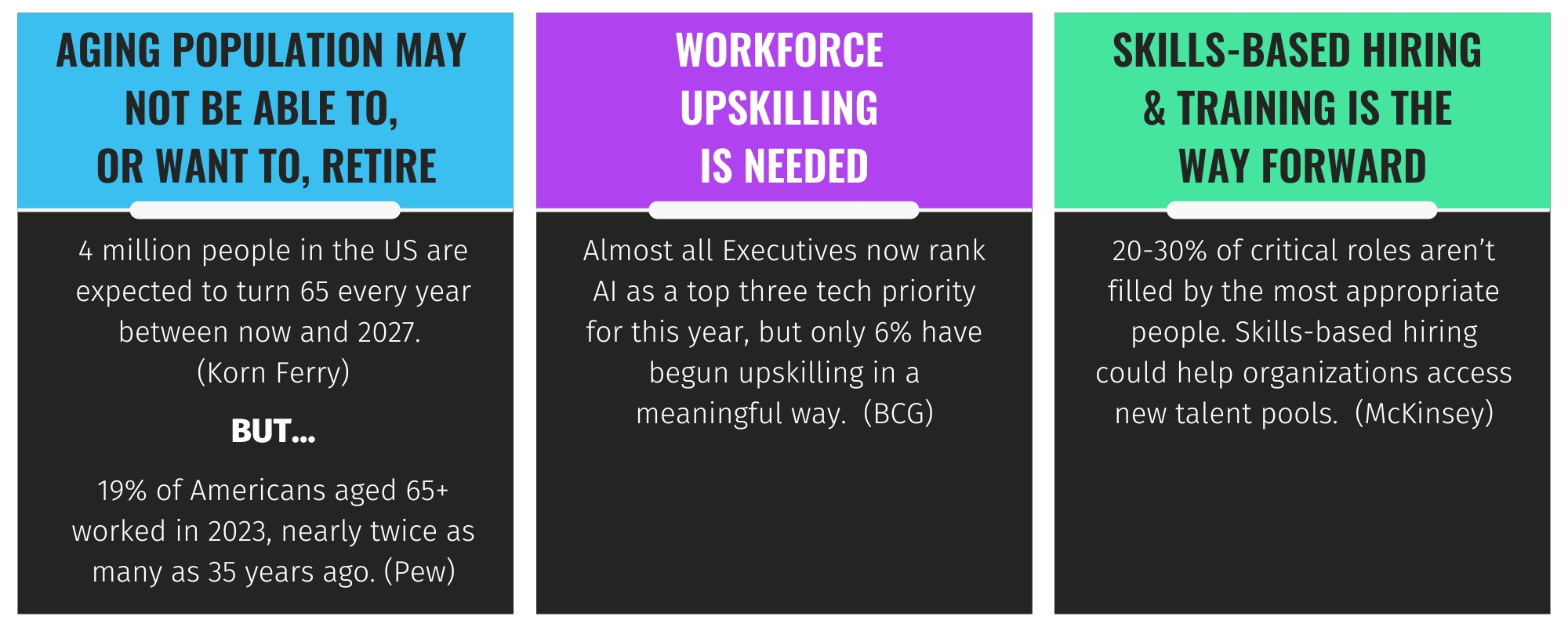The New Face of Mobility - Adapting to Diverse and Evolving Talent Needs
With five generations currently in the workforce, organizations are faced with a wide spectrum of evolving needs, ways of working, priorities, and expectations. Companies are having important strategic workforce conversations about not only when we work, but where and how. A new wave of flexible options is emerging to suit the diverse requirements of a multi-generational workforce.
There’s also been a shift away from “traditional” roles, titles, and responsibilities towards a skills-based approach. Human Resources and Talent functions are increasingly recognizing the importance of transferable skills that can be allocated cross-functionally to ensure critical business initiatives are delivered. This means that getting the right talent, to the right place, at the right time is more important than ever.
With these global mobile workforce trends in mind, Mobility’s priorities are balancing the need to retain talent and develop skills, with the need to deliver business objectives and remain compliant. So how can global mobility evolve to support these changing work practices, and remain agile in future? It’s a big topic to tackle, but let’s take a look the current state of talent needs, as well as considerations for future approaches.
Changing World and Evolving Talent Needs

Assessing Current Mobility Solutions
In addition to traditional mobility policy approaches, such as long-term assignments, short-term assignments, and commuters, alternative policy approaches are being discussed or used, such as volunteer moves, returnship policies, virtual assignments, and gig policies. Many of these alternative policy types have been introduced in an attempt to balance the diverse employee experience and business priorities, but it’s worth noting that new doesn’t always equal better. For example, there was a lot of hype around “work from anywhere” but not many organizations have been able to make it work comprehensively from a compliance perspective.
With all of the discussion around alternative mobility approaches, there is also a lot of crossover, duplication, conflicting definitions, and instances of the same-old policy types being used, just with new labels. There are pros and cons to both the traditional and new forms of mobility, but it’s possible that embedding flexibility and new policy considerations into existing policies might be better for some companies in the end. Therefore, it’s important that you consider the matter in relation to your own corporate culture to balance support of business needs and compliance with employee needs and priorities.
Future State Considerations for Modernizing Mobility
Mobility professionals need to consider how to support the evolving world of work by assessing what works, and what may need to change in existing solutions, provisions, and approaches. A number of considerations have emerged:

-
Understanding there is not one right solution.
Adapting for diverse needs may look unique at different organizations based on your corporate culture and priorities
-
Differing approaches exist for supporting changing employee needs.
There are a number of ways organizations can approach evolving employee/family needs, including:- Focusing on the specific mobility policy type or provisions to adapt to support different employee profiles.
- Focusing more on aligning business and talent objectives by providing a talent pathway and prioritizing skills development to balance career aspirations and expectations with future business needs.
-
Addressing the unknowns of differing family situations and priorities.
It is important to have two-way conversations with relocating employees to fully understand their concerns and support them effectively rather than basing your approach on assumptions or stereotypes. -
Ensuring consistency is important.
To ensure that unique family needs are addressed, it is important to have consistent support across all suppliers, not just with the consultant or RMC contact, but with the household goods and destination service providers on the ground. -
Aligning costs with employee expectations.
Cost constraints often cause a misalignment with employee expectations. Possible solutions include setting expectations differently, providing an element of choice and control rather than more provisions, or offering cost neutral support that would change perceptions. -
Understanding split family challenges.
For organizations considering policies that include family separation, for example in the case of family feeling unsafe or unsupported in the host location because of their LGBTQIA+ status, it is important to discuss how to keep families connected and the employee committed and engaged, as well addressing any possible emotional and psychological strain impacts. -
Leading with empathy.
It is important to see your employees and their families as humans with fears, worries, and aspirations. Designing agile mobility approaches can not only support their needs and priorities, but also ensure relocating employees feel seen and heard.
If you would like more information about designing a mobility program that meets the needs of a changing workforce while meeting organizational goals, please email us at concierge@sirva.com or reach out to your Sirva representative.






.png?sfvrsn=a2562a1f_2)
